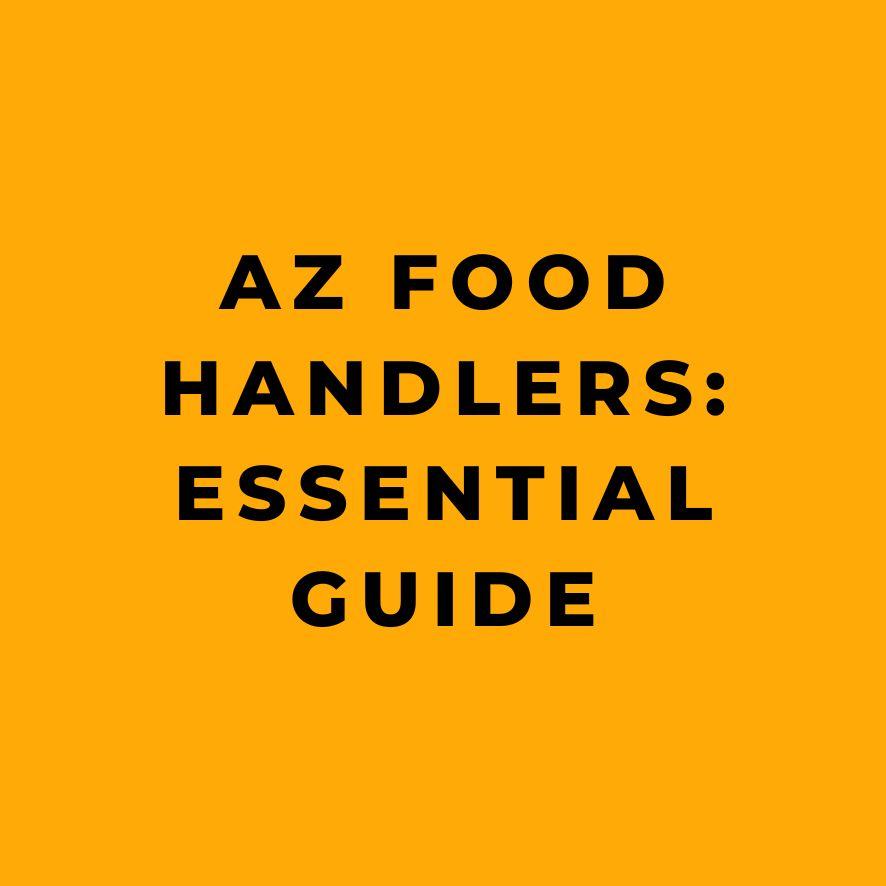Food safety is a crucial component of the restaurant and food service industry. Ensuring that food handlers are well-trained in safe food handling practices is essential for preventing foodborne illnesses and maintaining public health. In Arizona, the regulations for food handler training and certification vary by county, with each county having its own specific requirements and enforcement mechanisms. This comprehensive guide aims to provide an in-depth understanding of Arizona food handlers’ compliance, covering key concepts, background information, specific county requirements, and practical insights for food workers and restaurant owners.
Understanding Arizona Food Handlers Compliance
In Arizona, food handler compliance is governed by a combination of state legislation and county-specific regulations. The Arizona Revised Statutes (ARS) 36-136 (H)(4)(g) mandates food workers to acquire a food handler’s card. However, the specific requirements for obtaining a food handler’s card vary by county, and each county has the authority to establish its own food safety regulations. It’s important to note that even in counties where a food handler’s card is not explicitly required, proper food handling training is highly encouraged to prevent foodborne illness outbreaks.
County-Specific Regulations
Each county in Arizona has its own set of requirements for food handler training and certification. For instance, in Maricopa County, all food-handling employees are required to obtain a Food Handler’s Certificate, with the person in charge at the food establishment responsible for ensuring compliance with this requirement. Similarly, other counties such as Coconino County, Gila County, Greenlee County, La Paz County, Mohave County, Pinal County, Santa Cruz County, and Yavapai County have their specific regulations regarding food handler training and certification.
It’s essential for food workers and restaurant owners to stay updated with the specific food handler training requirements in their respective counties. Regularly checking with the local health department or regulatory authorities can help in staying informed about any updates or changes to food handler training requirements.
Accredited Training Programs
To meet the specific county requirements, it’s crucial to ensure that food handler training programs are accredited by reputable organizations such as the American National Standards Institute (ANSI) and the American National Standards Institute-American National Accreditation Board (ANAB). ANAB accreditation ensures that the training program meets high standards of quality and effectiveness in preparing food handlers for safe food handling practices. The National Restaurant Association’s ServSafe Food Handler Online Course and Assessment is one such accredited training program that covers essential areas such as basic food safety, personal hygiene, cross-contamination and allergens, time and temperature, and cleaning and sanitation. Completing a training course and passing an assessment from programs like ServSafe is a step towards obtaining the Food Handler Certificate/Card, meeting all the requirements set by the state and county regulations.
ANSI-Accredited Providers:
- AAA Food Handler, AZ Food Handler Program
- 123 Premier Food Safety, Food Handler Training Certificate Program
- 360training.com, Inc., Food Handler Training Course
- A Plus Food Training L.L.C. Food Handler
- AboveTraining/StateFoodSafety.com, Food Handler Training Certificate Program, Food Safety
Essentials - ACE Food Handler, Food Handler Training
- Cogneti LLC, Safe Food Handler Certificate
- Diversys Learning Inc, Food Handler Safety Training
- eFoodhandlers Inc., eFoodhandlers Basic Food Safety
- EFOODTRAINER Inc., Mobile App and Online Food Handler Certificate
- Food Handler Solutions LLC, Food Handler Certificate
- Food Marketing Institute, SafeMark Quick Reference: Food Safety for Food Handlers
- Food Safety Educators, eFoodcard
- FoodHandlerClasses.com, Food Handler Classes
- Institute of Food Safety, Health, & Hygiene, Inc., Food Handler Training Certificate Program
- MenuTrinfo, LLC, Food Handler
- MyCertify, Food Handler Training Certificate Program
- National Environmental Health Association, Food Handler Training Certificate
- National Registry of Food Safety Professionals®. Food Safety First Principles for Food Handlers
- National Restaurant Association, ServSafe Food Handler Program
- Responsible Training / Safeway Certifications, LLC, Responsible Training Food Safety Program
- Rserving, Food Safety for Handlers
- TAP Series, Food Handler Course and Assessment
- The Always Food Safe Company, LLC, The Level 2 Award in Food Safety for Food Handlers*Please note that the above list of accredited providers is subject to change.
Best Practices and Tips for Compliance
Here are some best practices and tips for compliance with Arizona food handler regulations:
1. Stay Informed: Regularly check with the local health department or regulatory authorities to stay updated about any updates or changes to food handler training requirements in your county.
2. Accredited Training Programs: Ensure that the food handler training program is ANAB-accredited to meet the specific county requirements, providing high-quality and effective training.
3. Renewal and Recertification: Be mindful of the expiration date of the food handler card and initiate the renewal process as required by the county regulations. It’s important to stay current with the certification to ensure ongoing compliance.
4. Safe Food Handling Practices: Implement and maintain safe food handling practices in your food establishment to prevent foodborne illnesses and ensure public health and safety.
Practical Insights for Food Workers and Restaurant Owners
Obtaining the necessary food handler training and certification not only ensures compliance with regulations but also demonstrates a commitment to food safety and public health. By investing in comprehensive and accredited training programs for food handlers, restaurant owners can enhance the skills and knowledge of their employees, thereby reducing the risk of foodborne illness outbreaks and maintaining a positive reputation for their establishment.
Conclusion
In conclusion, Arizona food handlers’ compliance is a multifaceted aspect of ensuring food safety and public health in the state. With county-specific regulations and varying requirements, it’s imperative for food workers and restaurant owners to stay informed, seek accredited training programs, and uphold safe food handling practices. By adhering to the best practices and tips for compliance, food establishments can contribute to a healthier and safer dining experience for their customers while meeting the legal obligations set forth by the state and county regulations. The commitment to food safety through proper training and certification not only benefits public health but also enhances the reputation and credibility of food establishments in Arizona.










